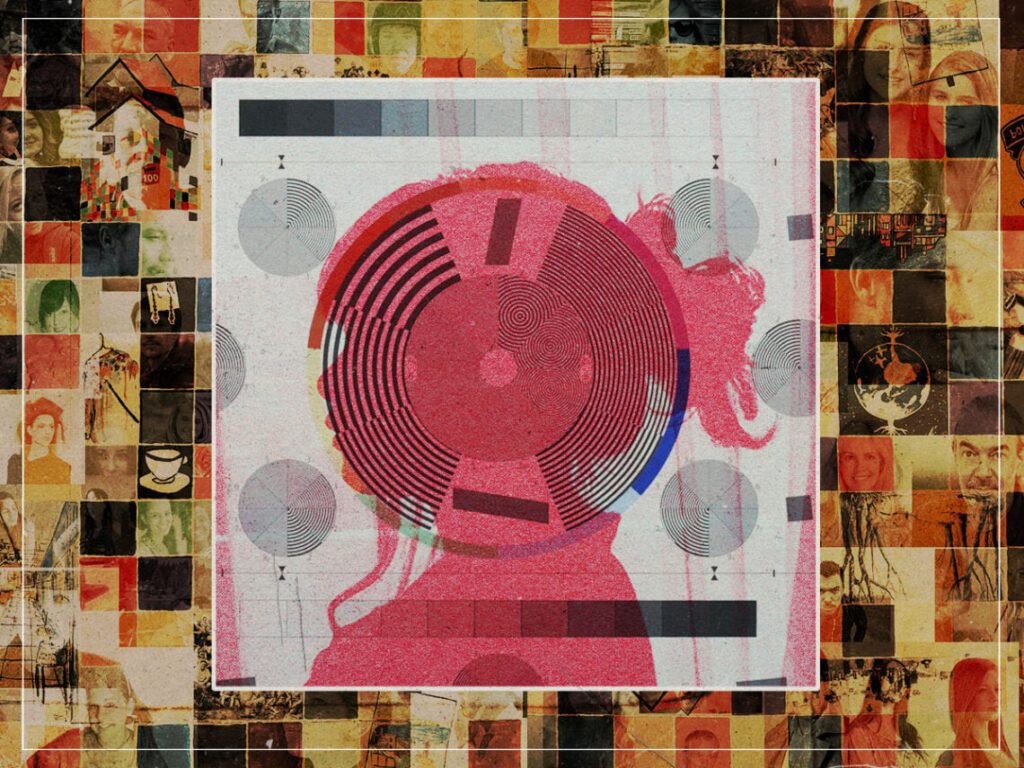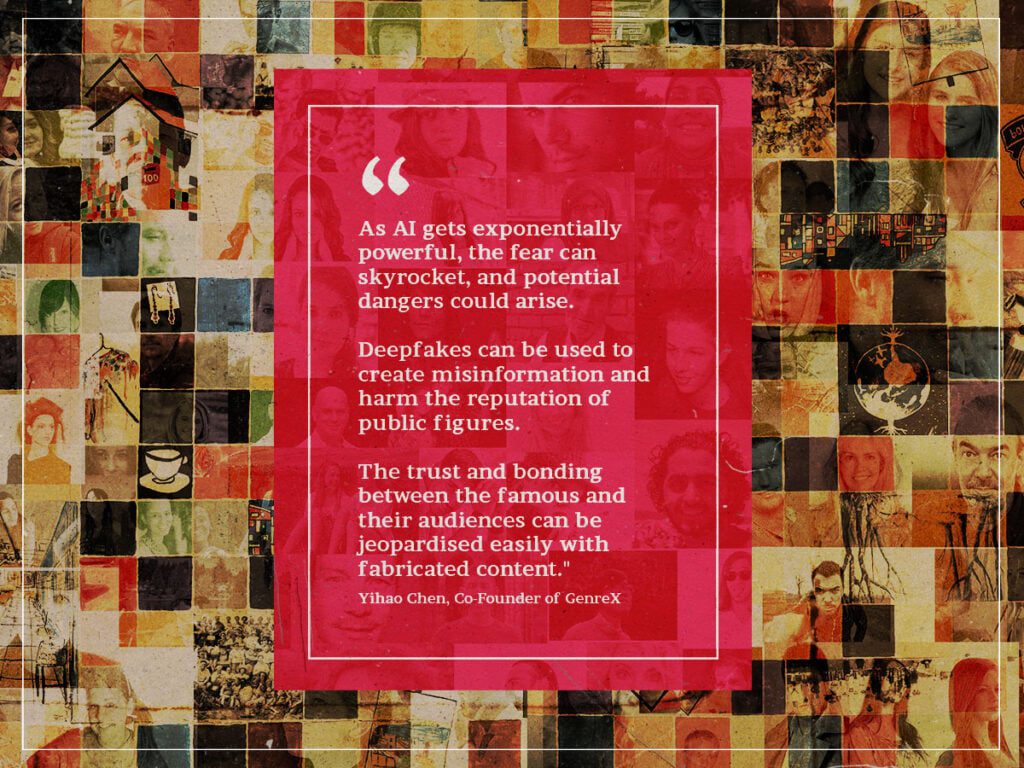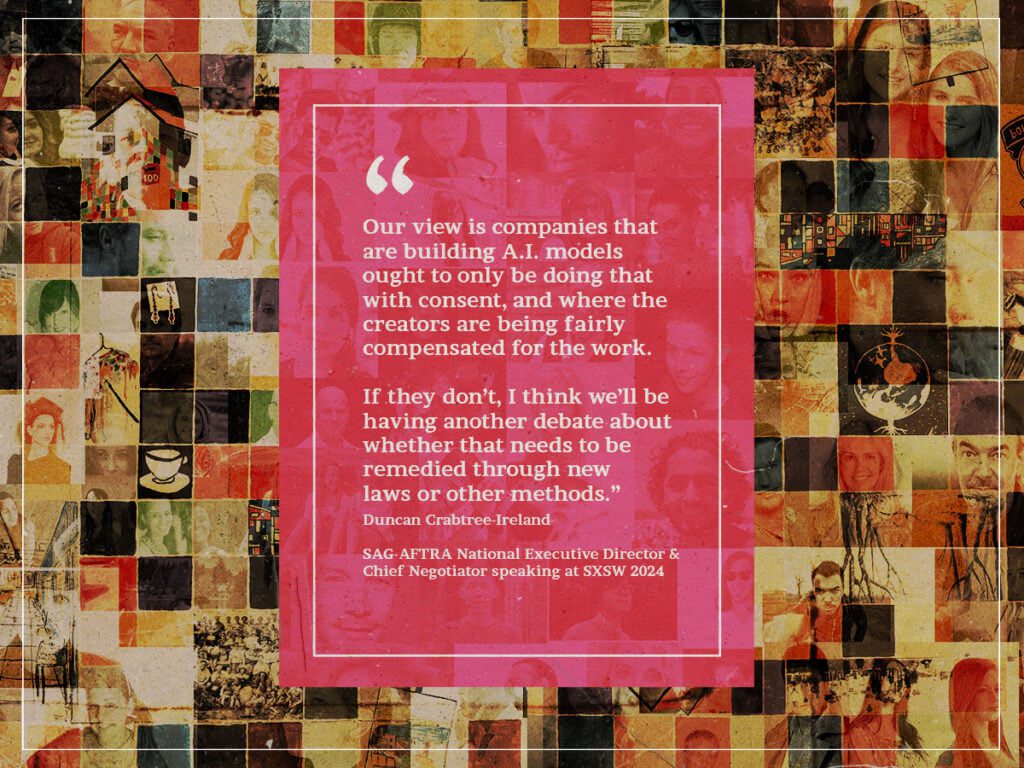Who owns our faces? Experts explain why AI legislation in creative industries is crucial
 Posted On
Posted On
(Credits: Far Out / Amelia Wahyuningtias / Yannis H / Rawpixel)
Networked communication – or social media, as we call it – was first introduced in 1997 with a platform that could host interpersonal networks. Although the obvious dangers were there, legislation and regulation are still an ongoing issue some 27 years later. Artificial Intelligence (AI) has been infiltrating our systems for decades, with many of its benefits broadly centring around efficiency and precision. Today, however, AI developments are playing out like an episode of Black Mirror, with the ability to replicate our faces, voices, and even mannerisms with terrifying accuracy.
In an example of life imitating art, this actually was an episode of Black Mirror called ‘Joan is Awful’, which depicted our protagonist waking up one day to realise a streaming platform suspiciously similar to Netflix had imitated her entire life – including her appearance, accent, job, you name it – and made it into a television series. She is freaked out the second she realises that her life is playing out on screen, right down to the specific conversations she had the day before.
While Charlie Brooker generally sets out to depict worlds that showcase the most severe consequences of modern technology, the chilling aspect of this particular episode is that it’s not far from reality. There are many instances every day of techies working with anyone from large organisations to smaller independents who seem to be constantly testing out the boundaries of AI and imitation. The worst-case scenario is that the technology advances to a point where human intervention becomes wholly eradicated, and there’s no longer a need for physical originals in movies, music, marketing, television, and so on.
This is a world where famous figures are at heightened risk of being exploited in various ways, from unofficial usage of their likeness to even more sinister ways like what Taylor Swift, unfortunately, had to endure. The inception of the latest SAG-AFTRA strike centred around AI paranoia, with many actors protesting against the use of their characteristics for monetary gain. As a result, the union promised greater protection of its members “from the threat of AI” and enhanced information and education prior to AI-infiltrated projects.
This isn’t just an issue for the most famous actors, either – if the crushing realities of pay disparities weren’t enough of a challenge, extras face the detrimental impact of AI in numerous ways, including the possibility that there will one day no longer be a need for their jobs. During the creation of WandaVision, actors were “scanned” for 15 minutes without knowledge of why, but later learned that the company would own the digital duplicates for “eternity”.
This has significant implications in the creative industries and raises questions about why there have yet to be any formal legislative policies implemented. It also raises eyebrows about whether greater protection needs to be taken more seriously. Moreover, what’s to be said of posthumous ownership? Who will own the faces of deceased celebrities and their estate? Where do ethics lie in all of this?
Raheel Govindji, CEO and Founder of ModClub, said that while it is becoming easier for “malicious actors to take user data and impersonate identities,” legislative action will come – but it will take time. Perhaps shockingly, Govindji states that priorities among AI companies may not currently be “compliance with future regulations”. Therefore, avoidance of later issues falls on the shoulders of those who may be at risk, with greater education and equipment becoming of significant importance – if we know how to avoid the potential pitfalls, prevention of AI illegalities could be a possibility.

According to Yihao Chen, Co-Founder of GenreX, however, it may not be this simple. People are becoming more aware of the capabilities of AI, but this is also in a very broad sense. “To the majority, AI is a black box, and many things are uncertain, especially in the music and entertainment sectors,” he explains, adding that AI still needs a lot of myth-busting so that anybody can better identify when we are facing a genuine AI problem and when it’s just a buzzword.
“Long-term education is needed to fully demystify AI’s capability and understand how it can help with human creativity,” Chen adds, effectively agreeing with Govindji’s earlier sentiment about the importance of time in dispelling AI’s negative implications and capabilities. Similarly, as the fearmongering around AI becomes stronger, it’s interesting to attempt to navigate which parts of the conversation are driven by empty anxieties and which are rooted in genuine concerns. The SAG-AFTRA strike, for instance, is a solid example of the latter.
“As AI gets exponentially powerful, the fear can skyrocket, and potential dangers could arise,” Chen explains. “Deepfakes can be used to create misinformation and harm the reputation of public figures. The trust and bonding between the famous and their audiences can be jeopardised easily with fabricated content”.
“Deepfakes can be used to create misinformation and harm the reputation of public figures. The trust and bonding between the famous and their audiences can be jeopardised easily with fabricated content.”
How imminent is AI legislation and regulation?
AI legislation will likely impact many policies, including data protection, security, equality and human rights, intellectual property, disinformation, and more. The issue is the rapid pace at which AI is developing compared with the amount of time it takes to implement new legislation and regulations. At the moment, there is no dedicated AI legislation in the UK, and most claims are made on the basis of exploitation or impact on mental health.
The UK has introduced many measures in recent years that demonstrate their positive approach to AI and innovation. Still, it has yet to officially address the negative implications of AI in terms of imitation and deepfakes. It seems there are more concerns about data protection and more legislative measures to accompany that, like the GDPR. However, even in companies where AI is being used to streamline processes, other potential disadvantages exist, such as unconscious bias. If AI is being used in the hiring process, for example, what happens when it decides to only choose white people as potential candidates?

On social media, realistic images and deepfakes have become a natural part of “scrolling” – we witnessed this recently with the controversy generated by Kate Middleton’s Mother’s Day photograph. While she claimed this to be a result of “amateur” editing, many suggested that the photo had been completely AI-generated, leading to a lot of misinformation and speculating about Middleton’s health, personal life, and even political views.
While the entire conversation runs the risk of exaggerating potential concerns, many more deepfakes are coming out of the woodwork, some of which are satirical, while others are potentially harmful. From January 2024, the UK made it illegal to share Deepfakes for pornographic purposes, significantly tightening the reigns on sharing deceitful images and videos for malicious purposes. This came as part of the country’s Online Safety Act in an effort to crack down on non-consensual content.
However, this doesn’t challenge current issues around ownership and control – many of us sign up to new platforms or agree to contracts without reading the finer print, so what’s stopping companies from creating loopholes and getting people to sign over their digital replicas? At the minute, nobody owns our faces except everybody, so perhaps it really is a free-for-all, and opportunistic AI users can do whatever they want with whoever they want.
On the other hand, a lack of legislation doesn’t always mean a lack of consequences, and certain situations can be treated with a proportionate level of seriousness by those with the authority and the willingness to support those who may need it the most. At this point in time, however, the most important aspect is education, not only for famous figures but for everybody, as being knowledgeable ensures the potential mystification of future rights.
[embedded content]


